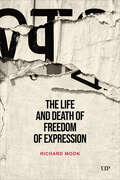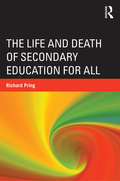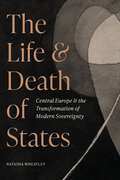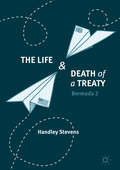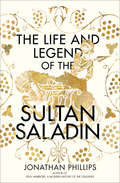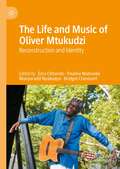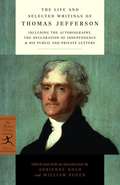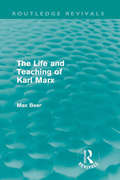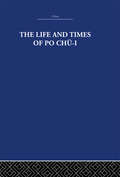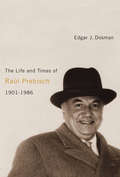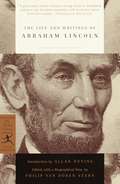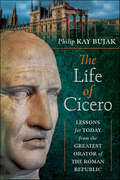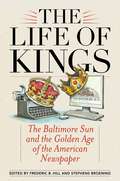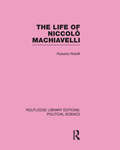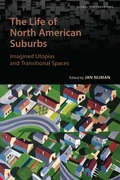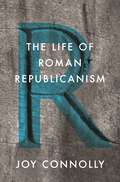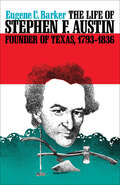- Table View
- List View
The Life and Death of Freedom of Expression
by Richard MoonIn The Life and Death of Freedom of Expression, Richard Moon argues that freedom of expression is valuable because human agency and identity emerge in discourse – in the joint activity of creating meaning. Moon recognizes that the social character of individual agency and identity is crucial to understanding not only the value of expression but also its potential for harm. The book considers a range of issues, including the regulation of advertising, hate speech, pornography, blasphemy, and public protest. The book also considers the shift to social media as the principal platform for public engagement, which has added to the ways in which speech can be harmful while undermining the effectiveness of traditional legal responses to harmful speech. The Life and Death of Freedom of Expression makes the case that the principal threat to public discourse may no longer be censorship, but it is rather the spread of disinformation, which undermines public trust in traditional sources of information and makes engagement between different positions and groups increasingly difficult.
The Life and Death of Secondary Education for All
by Richard PringIs there life after death for secondary education? This book focuses upon the quality of learning. ‘Reform’, so called, too often begins with qualifications, examinations, institutional provision, paths of progression. All those are very important, but their value lies in the support they give to learners and their learning in its different forms. One needs to start with the aims of education and then with what it means to learn (practically, theoretically, morally) and with the very many different needs of the learners. That is what this book aims to do. In so doing, it will be both philosophical in analysis and empirical in example. So much is happening ‘from down below’ that goes unrecognised by policy makers. But innovations too often get hampered by government interventions, by a bureaucratic mentality and by failure to spread good practice. The general argument of the book, therefore, will be illustrated throughout with detailed references to practical developments in schools, colleges, the third sector, youth work, independent training providers and professional bodies – across several countries. The book builds on Education for All, which was based on 14-19 research into secondary education, this book transcends the particularities of England and Wales and digs more deeply into those issues which are at the heart of educational controversy, policy and practices and which survive the transience of political change and controversy. The issues (the aims of education, standards of performance, the consequent vision of learning, the role of teachers, progression from school to higher or further education and into employment, the provision of such education and training and the control of education) are by no means confined to the UK, or to this day and age. Pring identifies similar problems in other countries such as the USA, Germany and France – and indeed in the Greece of Plato and Aristotle and offers solutions with a comparative perspective. It is a critical time. Old patterns of education and its provision are less and less suitable for facing the twenty-first century. The patterns and modes of communication have changed radically in a few years and those changes are quickening in pace. The economic context has been transformed, affecting the skills and knowledge needed for employment. The social world of young people raises fresh demands, hopes and fears. A global recession has affected young people disproportionately making quality of life and self-fulfilment ever more difficult to attain. In addressing ‘learning’ and the ‘learners’ first and foremost, the book will argue for a wider vision of learning and a more varied pattern of provision. Old structures must give way to new.
The Life and Death of States: Central Europe and the Transformation of Modern Sovereignty
by Natasha WheatleyAn intellectual history of sovereignty that reveals how the Habsburg Empire became a crucible for our contemporary world orderSprawled across the heartlands of Europe, the Habsburg Empire resisted all the standard theories of singular sovereignty. The 1848 revolutions sparked decades of heady constitutional experimentation that pushed the very concept of &“the state&” to its limits. This intricate multinational polity became a hothouse for public law and legal philosophy and spawned ideas that still shape our understanding of the sovereign state today. The Life and Death of States traces the history of sovereignty over one hundred tumultuous years, explaining how a regime of nation-states theoretically equal under international law emerged from the ashes of a dynastic empire.Natasha Wheatley shows how a new sort of experimentation began when the First World War brought the Habsburg Empire crashing down: the making of new states. Habsburg lands then became a laboratory for postimperial sovereignty and a new international order, and the results would echo through global debates about decolonization for decades to come. Wheatley explores how the Central European experience opens a unique perspective on a pivotal legal fiction—the supposed juridical immortality of states.A sweeping work of intellectual history, The Life and Death of States offers a penetrating and original analysis of the relationship between sovereignty and time, illustrating how the many deaths and precarious lives of the region&’s states expose the tension between the law&’s need for continuity and history&’s volatility.
The Life and Death of a Treaty: Bermuda 2
by Handley StevensThis book offers an exceptionally well informed and well documented study of the processes by which a Treaty is not only created, but managed and adapted as a living organism, responding to changing political and economic circumstances throughout its life. Bermuda 2, which governed air services between the UK and the USA from 1977 till 2008, had to accommodate rapid but volatile market growth, conflicting policies for a more open market, and a market structure which evolved from national champions to multinational alliances. With stakes high enough for Presidents and Prime Ministers to intervene at key moments, the dramatic narrative (Part I) is helpfully cross-referenced to a fully annotated Treaty text (Part II) as well as a unique collection of supplementary documents (Part III). These three elements offer students of international law and international relations, as well as to-day’s post-BREXIT practitioners, a comprehensive guide to the wide range of legal instruments and negotiating strategies that may be used to govern and regulate a major industry within the framework of a Treaty relationship.
The Life and Legend of the Sultan Saladin
by Jonathan PhillipsAn engaging biography that offers a new perspective on one of the most influential figures of the Crusades In 1187, Saladin marched triumphantly into Jerusalem, ending decades of struggle against the Christians and reclaiming the holy city for Islam. Four years later he fought off the armies of the Third Crusade, which were commanded by Europe’s leading monarchs. A fierce warrior and savvy diplomat, Saladin’s unparalleled courtesy, justice, generosity, and mercy were revered by both his fellow Muslims and his Christian rivals such as Richard the Lionheart. Combining thorough research with vivid storytelling, Jonathan Phillips offers a fresh and captivating look at the triumphs, failures, and contradictions of one of the Crusades’ most unique figures. Bringing the vibrant world of the twelfth century to life, this book also explores Saladin’s complicated legacy, examining the ways Saladin has been invoked in the modern age by Arab and Muslim leaders ranging from Nasser in Egypt, Asad in Syria, and Saddam Hussein in Iraq to Osama bin Laden, as well as his huge appeal across popular culture in books, drama, and music.
The Life and Music of Oliver Mtukudzi: Reconstruction and Identity
by Ezra Chitando Pauline Mateveke Munyaradzi Nyakudya Bridget ChinouririThis book is a critical reflection on the life and career of the late legendary Zimbabwean music icon, Oliver “Tuku” Mtukudzi, and his contribution towards the reconstruction of Zimbabwe, Africa and the globe at large. Mtukudzi was a musician, philosopher, and human rights activist who espoused the agenda of reconstruction in order to bring about a better world, proposing personal, cultural, political, religious and global reconstruction. With twenty original chapters, this vibrant volume examines various themes and dimensions of Mtukudzi’s distinguished life and career, notably, how his music has been a powerful vehicle for societal reconstruction and cultural rejuvenation, specifically speaking to issues of culture, human rights, governance, peacebuilding, religion and identity, humanism, gender and politics, among others. The contributors explore the art of performance in Mtukudzi’s music and acting career, and how this facilitated his reconstruction agenda, offering fresh and compelling perspectives into the role of performing artists and cultural workers such as Mtukudzi in presenting models for reconstructing the world.
The Life and Selected Writings of Thomas Jefferson
by Adrienne Koch William PedenThis text contains a selection of Thomas Jefferson's writings which include his autobiography, the Declaration of Independence, entries from his travel journals, biographical sketches of his contemporaries, public and private letters, and 'Notes on Virginia.'
The Life and Teaching of Karl Marx (Routledge Revivals)
by Max BeerFirst published in English in 1921, this work was originally written by renowned Marxist historian Max Beer to commemorate the centenary of Marx’s birth. It is a definitive biography, full of interesting personal details and a clear and comprehensive account of Marx’s economic and historical doctrines A special feature of this unique work is the new light thrown on Marx’s attitude to the "Dictatorship of the Proletariat" and Bolshevist methods generally.
The Life and Thought of Friedrich Engels: 30th Anniversary Edition (Marx, Engels, and Marxisms)
by Terrell CarverWorldwide political changes since 1990 have driven a re-evaluation of Marxism, a renaissance in Marx-studies, and a renewed interest in his lifelong intellectual partner and personal friend Friedrich Engels. In Terrell Carver’s 30th anniversary edition of his pioneering biographical study of the ‘junior partner’ – which still remains the only one to balance Engels’s pre-Marx, with-Marx, and post-Marx writings, giving a rounded view of his life and thought – Carver adopts a comparative and critical approach, neither taking the ‘perfect partnership’ as a given, nor presuming that all the intellectual fireworks were Marx’s. Engels’s famously ‘bourgeois’ class position and ‘champagne socialist’ lifestyle emerge as resolutions rather than contradictions – they provided opportunities for activist writing and politicking that would not otherwise occur. This study is driven by questions that readers might like to ask about Engels, rather than by the sheer weight of archival materials and stereotypical framing. A newly written introduction provides reflections on how politics since the 1990s has brought Marx, Engels, and Marxisms back to life, and how publication of the Marx-Engels ‘collected works’ in a definitive edition, and in English translation, have promoted interpretive innovation. Engels himself did his best to establish his own biographical narrative. This book enables readers to assess that dominating view for themselves.
The Life and Times of Po Chü-i
by Arthur Waley The Arthur EstateFirst published in 1949. This book gives the biographical background to the many poems of Po Chü-I (A.D 772-846) and traces the connection between his literary career and the disturbed political life of the time. The volume also provides new translations in whole or in part of about a hundred poems by Po Chü-i.
The Life and Times of Raúl Prebisch, 1901-1986
by Edgar J. DosmanRaúl Prebisch was a leader in economic development theory and international economic policy, an institution builder, and an international diplomat. The Life and Times of Raúl Prebisch provides the first book-length account of his life and work, a story cast against the backdrop of Latin America, the Cold War, the rise of the United Nations, and the struggle for equity between first and third worlds. A wunderkind, Prebisch occupied key positions at the Argentine ministry of finance in his twenties and was the general manager of the Argentine Central Bank before forty. Exiled by Juan Perón after World War II, he became arguably the most influential Latin American official at the UN, heading such international organizations as the Economic Commission for Latin America and the United Nations Conference on Trade and Development.
The Life and Writings of Abraham Lincoln (Modern Library Classics)
by Abraham Lincoln Allan Nevins Philip Van SternAbraham Lincoln, the greatest of all American presidents, left us a vast legacy of writings, some of which are among the most famous in our history. Lin-coln was a marvelous writer--from the humblest letter to his great speeches, including his inaugural addresses, the Emancipation Proclamation, and the Gettysburg Address. His sentences were so memorably crafted that many resonate across the years. "Fourscore and seven years ago," begins the Gettysburg Address, "our fathers brought forth on this continent a new nation, conceived in liberty, and dedicated to the proposition that all men are created equal." In 1940, the prolific author and historian Philip Van Doren Stern produced this volume as a guide to Lincoln's life through his writings. Stern's "Life of Abraham Lincoln" is a full biography of the man and includes a detailed chronology. Stern has collected all the essential texts of Lincoln's public life, from his first public address--a stump speech in New Salem, Illinois, in 1832 for an election he went on to lose--to his last piece of public writing, a pass to a congressman who was to visit the president the day after Lincoln went to Ford's Theater on April 14, 1865. Some 275 such documents are collected and placed in their historical context. Together with the "Life" and the Introduction, "Lincoln in His Writings," by noted historian Allan Nevins, they give a full and vivid picture of Abraham Lincoln.The Modern Library has played a significant role in American cultural life for the better part of a century. The series was founded in 1917 by the publishers Boni and Liveright and eight years later acquired by Bennett Cerf and Donald Klopfer. It provided the foundation for their next publishing venture, Random House. The Modern Library has been a staple of the American book trade, providing readers with affordable hardbound editions of important works of literature and thought. For the Modern Library's seventy-fifth anniversary, Random House redesigned the series, restoring as its emblem the running torchbearer created by Lucian Bernhard in 1925 and refurbishing jackets, bindings, and type, as well as inaugurating a new program of selecting titles. The Modern Library continues to provide the world's best books, at the best prices.
The Life of Cicero: Lessons for Today from the Greatest Orator of the Roman Republic
by Philip Kay-BujakFresh new look at the life of Cicero, Rome’s greatest orator and one of the key figures of the 1st century. Cicero was Rome's greatest orator and one of the key statesmen of the late Roman Republic. He championed traditional Republican values against populist demagogues like Julius Caesar during a tumultuous period of civil war and unrest. During his term as consul (63 BCE), his decisive actions thwarted a plot to overthrow the Senate, controversially having the ringleaders executed. He outlived Caesar but then mounted a virulent opposition to Mark Antony, which led to Cicero's proscription and execution as an enemy of the state. The legacy of his speeches, letters and treatises on politics, law, oratory and other subjects endured, however, and was massively influential on Latin literature and, when rediscovered in the Middle Ages, formed one of the cornerstones of the Renaissance. The period in which Cicero flourished and died was one in which democracy was under attack from radical demagoguery and Philip Kay-Bujak believes his career holds important parallels and lessons for our own times. Written in a clear and accessible style, this fresh look at Cicero's life demonstrates his relevance to a modern audience.
The Life of Elizabeth I
by Alison WeirWeir describes herself as a social historian but admits that when chronicling the lives of the flamboyant Tudors, it's impossible to keep domestic politics and world affairs apart. One could hardly ignore the threatened depredations of the "invincible" Spanish Armada or pass over the intrigues of Mary Queen of Scots as she struggled to seize the throne and return England to Roman Catholicism. Weir has already negotiated the complex matrimonial life of Elizabeth's father in The Six Wives of Henry VIII and the early lives of the resulting progeny in The Children of Henry VIII. After a lonely and often perilous childhood during which Elizabeth was once imprisoned in the Tower and was nearly executed at the behest of her half sister, Queen Mary, 25-year-old Elizabeth ascended to the throne when Mary died. The prevailing expectation was that she would speedily marry a strong man who would then take over as king: as Elizabeth herself admitted, it was commonly thought that "a woman cannot live unless she is married." Elizabeth did nothing of the kind and, as Weir details, she did quite well for herself manipulating the royal marriage mart of Europe. Weir uses myriad details of dress, correspondence and contemporary accounts to create an almost affectionate portrait of a strong, well-educated ruler loved by her courtiers and people alike. Hot-tempered, imperious Elizabeth has been the subject of innumerable biographies, many very good. But Weir brings a fine sense of selection and considerable zest to her portrait of the self-styled Virgin Queen.
The Life of George Washington
by Wayne Lapierre John MarshallAmerica's first president has captivated our interest for more than two centuries, but no biographer of George Washington knew him with the authenticity, intimacy, and depth of understanding as John Marshall exhibited in his book The Life of George Washington.This biography was begun in 1799 following Washington's death, when chief justice Marshall was granted by Washington's surviving family full access to all of his records, papers, and personal archives. The result is a story not only of George Washington, but also of America's founding.Marshall covers every major event in Washington's personal life and in his public role as a founding father, including his childhood, his early career, his resignation as colonel, his marriage to Martha, the invasion of Canada, early negotiations with the British, the crossing of the Delaware, the state of Washington's army during the Revolution, the treason of Benedict Arnold, the official announcement of the election of Washington as president, meetings of Congress, a threatened war with France toward the end of his life, his death, and his character.Marshall's biography of George Washington was first published in Philadelphia in five volumes, between 1804 and 1807, and today, copies of this first edition are among the rarest and most expensive of antiquarian books. This edition is an exact facsimile of the one-volume edition published in 1857, also a very rare book, which was specially edited and abridged for a general audience by John Marshall himself.
The Life of George Washington: Commander In Chief Of The American Forces During The War Which Established The Independence Of His Country, And First President Of The United States, Volume 1
by Wayne Lapierre John MarshallAmerica’s first president has captivated our interest for more than two centuries, but no biographer of George Washington knew him with the authenticity, intimacy, and depth of understanding as John Marshall exhibited in his book The Life of George Washington.This biography was begun in 1799 following Washington’s death, when chief justice Marshall was granted by Washington’s surviving family full access to all of his records, papers, and personal archives. The result is a story not only of George Washington, but also of America’s founding.Marshall covers every major event in Washington’s personal life and in his public role as a founding father, including his childhood, his early career, his resignation as colonel, his marriage to Martha, the invasion of Canada, early negotiations with the British, the crossing of the Delaware, the state of Washington’s army during the Revolution, the treason of Benedict Arnold, the official announcement of the election of Washington as president, meetings of Congress, a threatened war with France toward the end of his life, his death, and his character.Marshall’s biography of George Washington was first published in Philadelphia in five volumes, between 1804 and 1807, and today, copies of this first edition are among the rarest and most expensive of antiquarian books. This edition is an exact facsimile of the one-volume edition published in 1857, also a very rare book, which was specially edited and abridged for a general audience by John Marshall himself.Skyhorse Publishing, along with our Arcade, Good Books, Sports Publishing, and Yucca imprints, is proud to publish a broad range of biographies, autobiographies, and memoirs. Our list includes biographies on well-known historical figures like Benjamin Franklin, Nelson Mandela, and Alexander Graham Bell, as well as villains from history, such as Heinrich Himmler, John Wayne Gacy, and O. J. Simpson. We have also published survivor stories of World War II, memoirs about overcoming adversity, first-hand tales of adventure, and much more. While not every title we publish becomes a New York Times bestseller or a national bestseller, we are committed to books on subjects that are sometimes overlooked and to authors whose work might not otherwise find a home.
The Life of Henrietta Anne: Daughter of Charles I
by Melanie CleggThis biography of the seventeenth-century English princess tells a sweeping tale of war and exile, marriage and scandal, and a triumphant reversal of fortune. Henrietta Anne Stuart, youngest child of Charles I and Henrietta Maria, was born in June 1644 in the besieged city of Exeter at the very height of the English Civil War. The hostilities had separated her parents, and her mother was on the run from Parliamentary forces when she gave birth with only a few attendants on hand. Within a few days she was on her way to the coast for a moonlit escape to her native France, leaving her infant daughter in the hands of trusted supporters. A few years later, Henrietta Anne would herself be whisked, disguised as a boy, out of the country and reunited with her mother in France, where she stayed for the rest of her life. But Henrietta&’s fortunes dramatically changed for the better when her brother, Charles II, was restored to the throne in 1660. After being snubbed by her cousin Louis XIV, she would eventually marry his younger brother Philippe, Duc d&’Orlans, and quickly become one of the luminaries of the French court—though there was a dark side to her rise to power and popularity when she became embroiled in love affairs with her brother-in-law Louis and her husband&’s former lover, the dashing Comte de Guiche, giving rise to several scandals and rumors about the true parentage of her three children. However, Henrietta Anne was much more than just a mere court butterfly. She also possessed considerable intelligence, wit, and political acumen, which led to her being entrusted in 1670 with the delicate negotiations for a secret treaty between her brother Charles II and cousin Louis XIV—which ensured England&’s support of France in their war against the Dutch. This is the story of her remarkable life.
The Life of Herbert Hoover
by Glen JeansonneThis is the first definitive study of the presidency of America's least understood and most under-appreciated Chief Executive. Combining government with private resources, Hoover became the first president to pit government action against the economic cycle, setting precedents and spawning ideas employed by his successor and all future presidents.
The Life of Kings: The Baltimore Sun and the Golden Age of the American Newspaper
by Frederic B. Hill Stephens BroeningIn an age when local daily papers with formerly robust reporting are cutting sections and even closing their doors, the contributors to The Life of Kings celebrate the heyday of one such paper, the Baltimore Sun, when it set the agenda for Baltimore, was a force in Washington, and extended its reach around the globe. Contributors like David Simon, creator of HBO’s The Wire, and renowned political cartoonist Kevin Kallaugher (better known as KAL), tell what it was like to work in what may have been the last golden age of American newspapers -- when journalism still seemed like “the life of kings” that H.L. Mencken so cheerfully remembered. The writers in this volume recall the standards that made the Sun and other fine independent newspapers a bulwark of civic life for so long. Their contributions affirm that the core principles they followed are no less imperative for the new forms of journalism: a strong sense of the public interest in whose name they were acting, a reverence for accuracy, and an obligation
The Life of Louis XVI
by John HardmanA thought-provoking, authoritative biography of one of history’s most maligned rulers: France’s Louis XVI “The definitive contribution to our understanding of Louis XVI as a man and a monarch.”—P. M. Jones, English Historical Review “Monumental. . . . Scholars probing the mysteries of the late Old Regime and French Revolution will be working in its shadow for many years to come.”—Thomas E. Kaiser, Journal of Modern History Louis XVI of France, who was guillotined in 1793 during the Revolution and Reign of Terror, is commonly portrayed in fiction and film either as a weak and stupid despot in thrall to his beautiful, shallow wife, Marie Antoinette, or as a cruel and treasonous tyrant. Historian John Hardman disputes both these versions in a fascinating new biography of the ill-fated monarch. Based in part on new scholarship that has emerged over the past two decades, Hardman’s illuminating study describes a highly educated ruler who, though indecisive, possessed sharp political insight and a talent for foreign policy; who often saw the dangers ahead but could not or would not prevent them; and whose great misfortune was to be caught in the violent center of a major turning point in history. Hardman’s dramatic reassessment of the reign of Louis XVI sheds a bold new light on the man, his actions, his world, and his policies, including the king’s support for America’s War of Independence, the intricate workings of his court, the disastrous Diamond Necklace Affair, and Louis’s famous dash to Varennes.
The Life of Niccolò Machiavelli (Routledge Library Editions: Political Science #26)
by Roberto RidolfiThis biography of Macchiavelli is widely regarded as Ridolfi’s masterpiece and is based on much material drawn from private and public archives. It presents a fresh interpretation of Macchiavelli’s career and writings and here, for example the dating of the composition of such famous works as the Prince and the Mandragola is established for the first time. This English translation, when originally published in 1963 included numerous correction and additions which brought it up to date with the most recent studies on Macchiavelli and his works.
The Life of North American Suburbs (Global Suburbanisms)
This book chronicles and explains the role of suburbs in North American cities since the mid-twentieth century. Examining fifteen case studies from New York to Vancouver, Atlanta to Chicago, Montreal to Phoenix, The Life of North American Suburbs traces the insightful connection between the evolution of suburbs and the cultural dynamics of modern society. Suburbs are uniquely significant spaces: their creation and evolution reflect the shifting demographics, race relations, modes of production, cultural fabric, and class structures of society at large. The case studies investigate the place of suburbs within their wider metropolitan constellations: the crucial role they play in the cultural, economic, political, and spatial organization of the city. Together, the chapters paint a compelling portrait of North American cities and their dynamic suburban landscapes.
The Life of Olaudah Equiano: Large Print (Dover Thrift Editions Ser.)
by Olaudah EquianoCompelling work traces the formidable journey of an Igbo prince from captivity to freedom and literacy and recounts his enslavement in the New World, service in the Seven Years War with General Wolfe in Canada, voyages to the Arctic with the Phipps expedition of 1772-73, six months among the Miskito Indians in Central America, and a grand tour of the Mediterranean as a personal servant to an English gentlemen. Skillfully written, with a wealth of engrossing detail, this powerful narrative deftly illustrates the nature of the black experience in slavery.
The Life of Roman Republicanism
by Joy ConnollyIn recent years, Roman political thought has attracted increased attention as intellectual historians and political theorists have explored the influence of the Roman republic on major thinkers from the Renaissance to the Enlightenment. Held up as a "third way" between liberalism and communitarianism, neo-Roman republicanism promises useful, persuasive accounts of civic virtue, justice, civility, and the ties that bind citizens. But republican revivalists, embedded in modern liberal, democratic, and constitutional concerns, almost never engage closely with Roman texts. The Life of Roman Republicanism takes up that challenge.With an original combination of close reading and political theory, Joy Connolly argues that Cicero, Sallust, and Horace inspire fresh thinking about central concerns of contemporary political thought and action. These include the role of conflict in the political community, especially as it emerges from class differences; the necessity of recognition for an equal and just society; the corporeal and passionate aspects of civic experience; citizens' interdependence on one another for senses of selfhood; and the uses and dangers of self-sovereignty and fantasy. Putting classicists and political theorists in dialogue, the book also addresses a range of modern thinkers, including Kant, Hannah Arendt, Stanley Cavell, and Philip Pettit. Together, Connolly's readings construct a new civic ethos of advocacy, self-criticism, embodied awareness, imagination, and irony.
The Life of Stephen F. Austin, Founder of Texas, 1793–1836: A Chapter in the Westward Movement of the Anglo-American People (Texas History Paperbacks Series)
by Eugene C. BarkerThe definitive biography of the legendary Empresario who colonized Texas for the Mexican government before leading the Texas Revolution. First published in 1925, The Life of Stephen F. Austin remains one of the finest works of Texas biography. An historian at the University of Texas, Eugene C. Barker spent nearly twenty-five years researching and writing this magisterial narrative, combining impeccable academic standards with engaging and lively prose. The son of Moses Austin, who received an empresario grant from Spain to settle Texas, Stephen took the mantle and began settling the region for the newly independent state of Mexico. He sold parcels of land to families of Anglo-Americans who later became known as the Old Three Hundred. When this growing Anglo community rebelled against the Mexican government, Austin led volunteer forces to victory at the Siege of Bexar and later served as Secretary of State for the Republic of Texas under President Houston.
